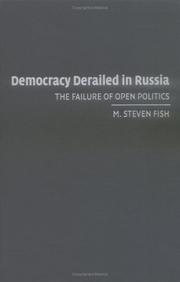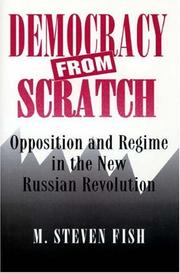| Listing 1 - 10 of 11 | << page >> |
Sort by
|

ISBN: 0521618967 0521853613 9780521618960 9780521853613 9780511791062 051114072X 9780511140723 0511139063 9780511139062 0511139950 9780511139956 0511791062 9786610416400 6610416400 113993127X 1107154782 1280416408 0511182872 0511301057 Year: 2005 Publisher: New York, NY : Cambridge University Press,
Abstract | Keywords | Export | Availability | Bookmark
 Loading...
Loading...Choose an application
- Reference Manager
- EndNote
- RefWorks (Direct export to RefWorks)
Why has democracy failed to take root in Russia? After shedding the shackles of Soviet rule, some countries in the postcommunist region undertook lasting democratization. Yet Russia did not. Russia experienced dramatic political breakthroughs in the late 1980s and early 1990s, but it subsequently failed to maintain progress toward democracy. In this book, M. Steven Fish offers an explanation for the direction of regime change in post-Soviet Russia. Relying on cross-national comparative analysis as well as on in-depth field research in Russia, Fish shows that Russia's failure to democratize has three causes: too much economic reliance on oil, too little economic liberalization, and too weak a national legislature. Fish's explanation challenges others that have attributed Russia's political travails to history, political culture, or to 'shock therapy' in economic policy. The book offers a theoretically original and empirically rigorous explanation for one of the most pressing political problems of our time.
Democracy --- Russia (Federation) --- Economic policy --- Politics and government --- #SBIB:328H262 --- Instellingen en beleid: Rusland en het GOS --- Self-government --- Political science --- Equality --- Representative government and representation --- Republics --- Social Sciences --- Political Science
Book
ISBN: 0190252502 1282977814 9786612977817 0199792348 9780199792344 0199773009 9780199773008 9780190252502 9780199769209 0199769206 9780199769216 Year: 2011 Publisher: New York : Oxford University Press,
Abstract | Keywords | Export | Availability | Bookmark
 Loading...
Loading...Choose an application
- Reference Manager
- EndNote
- RefWorks (Direct export to RefWorks)
Are Muslims Distinctive? represents the first major scientific effort to assess how Muslims and non-Muslims differ--and do not differ--in the contemporary world. Using rigorous methods and data drawn from around the globe, M. Steven Fish reveals that in some areas Muslims and non-Muslims differ less than is commonly imagined. Muslims are not inclined to favor the fusion of religious and political authority or especially prone to mass political violence. Yet there are differences: Gender inequality is more severe among Muslims, Muslims are unusually averse to homosexuality and other controversi
Muslims. --- Muslims --- Legal status, laws, etc. --- Mohammedans --- Moors (People) --- Moslems --- Muhammadans --- Musalmans --- Mussalmans --- Mussulmans --- Mussulmen --- Religious adherents --- Islam --- Muslims in popular culture. --- Islamic sociology. --- Attitudes. --- Public opinion. --- Muslim sociology --- Sociology, Islamic --- Sociology --- Popular culture

ISBN: 9781400821549 9780691029146 Year: 1996 Publisher: Princeton, N.J. Princeton University Press
Abstract | Keywords | Export | Availability | Bookmark
 Loading...
Loading...Choose an application
- Reference Manager
- EndNote
- RefWorks (Direct export to RefWorks)
Book
ISBN: 9780511575655 9780521514668 9781107602472 9780511508257 0511508255 0521514665 1316087247 0511575653 0511504489 0511508913 0511506627 1107602475 Year: 2009 Publisher: Cambridge ; New York : Cambridge University Press,
Abstract | Keywords | Export | Availability | Bookmark
 Loading...
Loading...Choose an application
- Reference Manager
- EndNote
- RefWorks (Direct export to RefWorks)
Where is the power? Students of politics have pondered this question, and social scientists have scrutinized formal political institutions and the distribution of power among agencies of the government and the state. But we still lack a rich bank of data measuring the power of specific governmental agencies, particularly national legislatures. This book assesses the strength of the national legislature of every country in the world with a population of at least a half-million inhabitants. The Legislative Powers Survey (LPS) is a list of thirty-two items that gauge the legislature's sway over the executive, its institutional autonomy, its authority in specific areas and its institutional capacity. Data were gathered by means of a vast international survey of experts, extensive study of secondary sources and painstaking analysis of constitutions and other relevant documents. Individual country chapters provide answers to each of the thirty-two survey items, supplemented by expert commentary and relevant excerpts from constitutions.
BPB0907 --- Parlement --- parlaments --- Parlament --- Parlamento --- parlament --- parliament --- kansanedustuslaitos --- κοινοβούλιο --- assembleia --- парламент --- parlement --- parlamentas --- parlamento --- rigsdag --- собрание --- zastupitelský sbor --- Országgyűlés --- Legislative bodies --- Bicameralism --- Legislatures --- Parliaments --- Unicameral legislatures --- Constitutional law --- Estates (Social orders) --- Representative government and representation --- parlaimint --- Social Sciences --- Political Science
Book
ISBN: 3319434373 3319434365 Year: 2017 Publisher: Cham : Springer International Publishing : Imprint: Palgrave Macmillan,
Abstract | Keywords | Export | Availability | Bookmark
 Loading...
Loading...Choose an application
- Reference Manager
- EndNote
- RefWorks (Direct export to RefWorks)
This edited volume seeks to understand and explain the pattern of varying national and regional success in post-communist political and economic transition across the post-communist world. Despite widespread hopes for the development of vigorous democratic political systems and vibrant market economies, the outcomes of a quarter century of post-communist transition in the countries of the former communist bloc in Eurasia have been widely variant. Some have matched these hopes, including becoming full members of the EU; others have fallen far short, with political and economic systems little changed from the communist era. This collection, with an internationally respected list of contributors, addresses some of the pressing issues in political science and transition studies, ranging from theoretical overviews to the more specific nitty-gritty of contemporary politics.
Political science. --- Political Science and International Relations. --- Political Science and International Relations, general. --- Europe, Eastern --- History --- Politics and government --- Administration --- Civil government --- Commonwealth, The --- Government --- Political theory --- Political thought --- Politics --- Science, Political --- Social sciences --- State, The

ISBN: 0691029148 0691037035 1282752111 1400821541 9786612752117 1400811600 9781400821549 9781282752115 1400802326 Year: 1994 Publisher: Princeton, N.J. Princeton University Press
Abstract | Keywords | Export | Availability | Bookmark
 Loading...
Loading...Choose an application
- Reference Manager
- EndNote
- RefWorks (Direct export to RefWorks)
This book presents a fresh view of Russian political change in the Gorbachev and early post-Soviet periods not by examining perestroika and glasnost in and of themselves, but by investigating the autonomous political organizations that responded to liberalization. Extensive study of these political groups, in Moscow and several provincial cities, has led M. Steven Fish to conclude that they were shaped to a far greater degree by the nature of the Soviet state than by socioeconomic modernization, political culture, native psychology, or Russian historical tradition. Fish's statist theory of societal change in Russia yields a powerful explanation of why Russia's new political society differs radically not only from the "totalized," sub-jugated country of the pre-1985 period but also from the "civil societies" found in the West and in many developing countries. In addition, the author shows how the legacy of the Soviet experience continues to influence the development--arguably the underdevelopment--of representative political institutions in post-Soviet Russia, making the establishment of stable democracy unlikely in the near term. This book proposes a novel and theoretically sophisticated way to study Russian politics. It offers a rigorous approach to understanding social movements, political party formation, regime change, and democratization in general. While focusing primarily on a single country, it is vigorously comparative at the same time.
Political parties --- Democracy --- Self-government --- Political science --- Equality --- Representative government and representation --- Republics --- Parties, Political --- Party systems, Political --- Political party systems --- Divided government --- Intra-party disagreements (Political parties) --- Political conventions --- Soviet Union --- Russia (Federation) --- Politics and government --- 1985-1991 --- 1991 --- -Russia (Federation) - Politics and government - 1991 --- -Political parties --- #SBIB:324H73 --- #SBIB:328H26 --- Politieke verandering: oppositie en minderheid, protest, politiek geweld --- Instellingen en beleid: USSR (actuele geschiedenis van de USSR: tot 1989) --- -Democracy --- Russia (Federation) - Politics and government - 1991 --- Russia (Federation) - Politics and government - 1991-
Digital
ISBN: 9783319434377 Year: 2017 Publisher: Cham Springer International Publishing :Imprint: Palgrave Macmillan
Abstract | Keywords | Export | Availability | Bookmark
 Loading...
Loading...Choose an application
- Reference Manager
- EndNote
- RefWorks (Direct export to RefWorks)
This edited volume seeks to understand and explain the pattern of varying national and regional success in post-communist political and economic transition across the post-communist world. Despite widespread hopes for the development of vigorous democratic political systems and vibrant market economies, the outcomes of a quarter century of post-communist transition in the countries of the former communist bloc in Eurasia have been widely variant. Some have matched these hopes, including becoming full members of the EU; others have fallen far short, with political and economic systems little changed from the communist era. This collection, with an internationally respected list of contributors, addresses some of the pressing issues in political science and transition studies, ranging from theoretical overviews to the more specific nitty-gritty of contemporary politics.
International relations. Foreign policy --- Politics --- communisme --- politiek
Digital
ISBN: 9780691230948 Year: 2021 Publisher: Princeton, N.J. Princeton University Press
Abstract | Keywords | Export | Availability | Bookmark
 Loading...
Loading...Choose an application
- Reference Manager
- EndNote
- RefWorks (Direct export to RefWorks)
Book

ISBN: 9780691230948 Year: 2021 Publisher: Princeton, NJ
Abstract | Keywords | Export | Availability | Bookmark
 Loading...
Loading...Choose an application
- Reference Manager
- EndNote
- RefWorks (Direct export to RefWorks)
Book

ISBN: 9781685857479 Year: 2022 Publisher: Boulder
Abstract | Keywords | Export | Availability | Bookmark
 Loading...
Loading...Choose an application
- Reference Manager
- EndNote
- RefWorks (Direct export to RefWorks)
| Listing 1 - 10 of 11 | << page >> |
Sort by
|

 Search
Search Feedback
Feedback About UniCat
About UniCat  Help
Help News
News